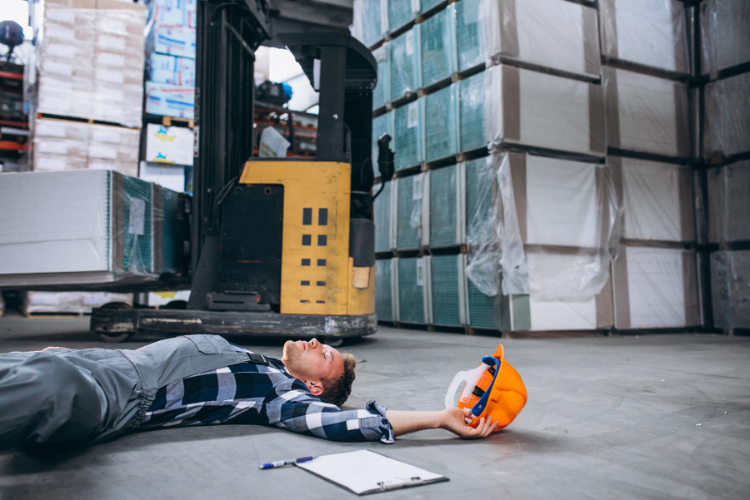Table Of Contents
- How To Understand Liability In Industrial Workplace Accidents?
- Employer And Third-Party Liability In Industrial Settings
- Third-Party Liability
- Defective Equipment And Manufacturers' Responsibility In Industrial Workplace Accidents
- Corporate Negligence In Industrial Workplace Accidents
- How To Prove Liability For Industrial Accidents?
- How To Seek Compensation For Medical And Financial Losses
- Steps To Take After An Industrial Workplace Accident
- Why You Need A Workplace Injury Lawyer
- Prevent Industrial Workplace Accidents More Effectively
Who Is Liable For Industrial Workplace Accidents? A Legal Guide For Injured Workers
Last Updated on: August 2nd, 2025
If you’ve ever worked in a factory, warehouse, or plant, you already know—it’s not the safest environment out there.
Between loud machines, chemicals, and just the general chaos, industrial workplace accidents aren’t exactly rare. And when things go wrong, they can go really wrong.
We’re talking injuries that don’t just knock you out of work. However, they can wreck your health. Additionally, they destroy your income, even your peace of mind.
So here’s the thing. I have met most people who want to know right away: Who’s actually responsible when industrial workplace accidents happen?
Moreover, it’s a big question, and the answer’s not always simple. In this quick guide, I will walk you through how blame gets figured out.
Furthermore, I will also give you important insights on who might be on the hook and what you can do if you’re caught in the middle of it all.
How To Understand Liability In Industrial Workplace Accidents?
Suppose that you or someone you know gets injured at work. Just this news is stressful enough,
However, now that you have to, figuring out who’s legally responsible can be even more challenging. That’s a whole other beast.
Sure, workers’ comp might cover the basics like your hospital bills or some lost wages. However, what if your injury happened because someone didn’t do their job right?
Therefore, in this case, there might be more money (and justice) on the table.
Moreover, many people don’t realize that there could be more than one party responsible. Depending on the situation, the blame could land on:
- Your boss or employer (maybe they ignored safety stuff)
- A contractor or outside crew working nearby
- The company that made a faulty machine or tool
Furthermore, that’s where a good injury attorney steps in—to sort out who’s really at fault and make sure they’re held accountable.
Employer And Third-Party Liability In Industrial Settings
So let’s talk about your employer for a second. By law, they’re supposed to keep the workplace safe.
Furthermore, this includes the following Occupational Safety and Health Administration (OSHA) regulations.
This provides adequate safety training. Additionally, it ensures equipment is properly maintained. If they mess that up, they could be legally responsible for things like:
- Not training workers properly
- Skipping safety drills or precautions
- Not giving people safety gear
- Leaving dangerous areas unfixed
But—and this is important—it’s not always just the employer who drops the ball.
Third-Party Liability
In a lot of industrial jobs, there are outsiders around too—contractors, vendors, property managers, you name it. If one of them caused or contributed to your injury, they could be liable too.
For example:
- A subcontractor installs something wrong and it collapses
- The property owner knows about a hazard but doesn’t fix it
- A supplier sends faulty or dangerous materials
All these things can shift liability outside your company. Therefore, it always helps to have someone in your corner who knows how to investigate these angles.
Defective Equipment And Manufacturers’ Responsibility In Industrial Workplace Accidents
Now let’s say it wasn’t a person—it was a piece of equipment that went haywire. That’s not uncommon.
Moreover, industrial machines are powerful and, frankly, a little scary when they don’t work right.
Now, suppose your injury was caused by defective machinery. Therefore, in this case, the manufacturer might be to blame. Think along the lines of:
- A conveyor belt that snaps mid-use
- A tool that’s poorly designed and risky from the start
- A machine with no warning labels or bad instructions
In that case, you might be able to bring a product liability case and go after the company that built or sold the faulty gear.
Corporate Negligence In Industrial Workplace Accidents
Sometimes, the problem isn’t just a mistake—it’s a whole pattern of bad decisions. Some companies are so focused on the bottom line that they’ll skimp on safety just to save a few bucks. That’s called corporate negligence.
It can look like:
- Making workers pull double shifts without breaks
- Blowing off safety complaints or OSHA citations
- Cutting costs on training or protective equipment
- Ignoring dangerous conditions that everyone’s aware of
Moreover, if a company is found guilty of this kind of thing, you could be entitled to a lot more than just your medical bills.
Furthermore, these include pain and suffering damages, or even extra compensation for the long-term impact.
How To Prove Liability For Industrial Accidents?
Okay, so here’s the deal: proving someone else is at fault isn’t just about saying it happened—it’s about showing it. And that means gathering real evidence.
Things that help build your case include:
- Accident reports
- Photos of the scene
- Statements from coworkers
- Medical documents showing your injury
- Any previous safety violations
- Experts who can explain what went wrong
If you wait too long, some of that stuff can disappear. So yeah—acting quickly really matters.
How To Seek Compensation For Medical And Financial Losses
Industrial accidents hit hard. And not just physically. Between missing work, paying hospital bills, and dealing with the emotional side of it all, the financial toll adds up fast.
Therefore, depending on the situation, you might be able to get compensation for:
- Medical costs (like ER visits, therapy, meds, etc.)
- Lost income (what you didn’t earn while recovering, or money you won’t earn again)
- Pain and suffering (because it’s not just about money—your life changed)
- Punitive damages (if someone acted with gross negligence)
Again, this stuff’s not automatic. A good lawyer can fight to make sure you’re not just getting scraps.
Steps To Take After An Industrial Workplace Accident
If something just happened and you’re hurt, take a breath—and then start taking action. What you do next can affect everything that follows.
Here’s what helps:
- See a doctor—even if you think it’s no big deal, just get checked.
- Tell your supervisor and make sure there’s a written report.
- Keep records—photos, bills, names of witnesses, all of it.
- Don’t talk to insurance folks without a lawyer backing you up.
- Get legal advice—ASAP. You don’t want to guess your way through this.
Why You Need A Workplace Injury Lawyer
Industrial injury claims can get messy. And complicated. You’ve got your employer, maybe some contractors, maybe even a shady manufacturer.
Moreover, they are all here, all with their lawyers, trying to protect themselves. Here’s why having your own workplace injury lawyer makes a difference:
- Firstly, they dig deep and find out what really happened
- Secondly, they figure out who’s legally responsible
- Thirdly, they deal with insurance adjusters, so you don’t have to
- Finally, they’ll go to court if a fair settlement isn’t offered
Bottom line: Working with an experienced lawyer increases your chances of recovering full and fair compensation.
Prevent Industrial Workplace Accidents More Effectively
Getting injured on the job is a nightmare. Moreover, it gets worse in high-risk industries like manufacturing or construction.
However, if you can figure out who’s at fault, it is a big step toward getting your life back on track.
Whether it was your employer or a third party, it surely doesn’t matter. Moreover, even if it’s your or a faulty machine that caused the accident, you have options—and rights.
Furthermore, with the right legal help, you can fight for the compensation you deserve. Moreover, after this, you can start putting the pieces back together. Therefore, it’s not easy, no doubt about that. But you don’t have to go through it on your own.
Read More:















